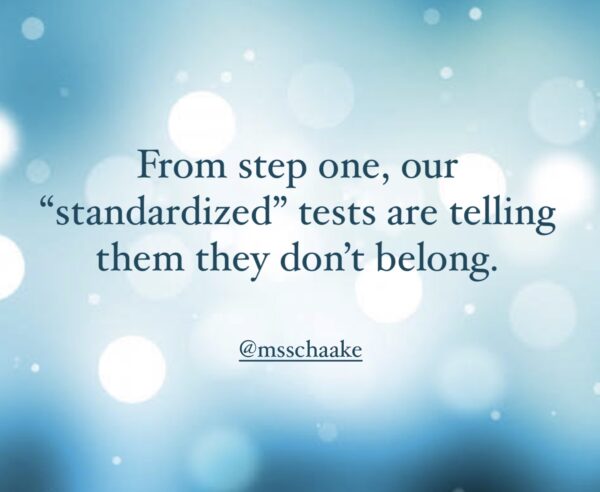Testing’s Back, Back Again
Last year, when Washington decided to delay standardized testing, I was ecstatic. I wonder why we give students high stakes tests at all, let alone during a global pandemic. These tests’ measurement of student learning are suspect in the best of circumstances, so testing during a global pandemic seemed laughable.
Plus, when we would have tested last spring, we were just starting hybrid learning and class time was a precious, rare commodity after a year of online learning.
But, as promised, these tests came back with a vengeance this fall. As a part of my new part time role in the library, I was tasked with coordinating and administering these tests. I like a challenge, and I enjoy system level thinking, but as someone who fundamentally disagrees with high stakes tests as measurements of students’ ability, the irony was not lost on me. I felt like “the man.”
To “make up” for last year, we ended up testing almost double what we’d normally do, taking care of delayed middle schoolers with our ninth graders and the skipped sophomores with our eleventh graders.
To add insult to my personal injury, there are still graduation waivers in place (thankfully!), so these tests aren’t exactly necessary. At all.
So when a student asked me “Is this graded? No? Oh, so, I could just click random buttons and get out of here?” it was hard to find a way to say something other than “Well, sort of. But still try your best. Please.”
Inequities in our Systems

Because I have only administered tests in the past for my sophomore English students, coordinating across the whole school gave me real insights into the inequities baked into the tests themselves.
For instance, most of the students who struggled even logging in were students of color. Several of our Black students have names with apostrophes or “non-standard” spacing and many of our Hispanic students have multiple first and last names. So, it became a guessing game to find which parts of their name the state recognizes as legitimate.
One of these students with emerging English proficiency was doing his best to take three subject tests but the program didn’t even acknowledge his name. From step one, our “standardized” tests are telling them they don’t belong.
Then, once we got the test rolling, the stress and utter bewilderment I saw, especially from students in IEP English and math, was heartbreaking.
One raised her hand and asked me, eyes wide, “What am I supposed to do? I have never seen this before and have no idea what to do. I haven’t been taught this.”
Students received the accommodations we’re legally required to give, but an “alternate testing space” is not going to make up for the content of the test themselves. That won’t alleviate the pressure they feel in a silent room, staring at a computer screen that is supposed to tell them how smart, or how behind they are compared to their peers.
Kindness Isn’t Enough
We have a lot of conversations in our building around equity and a lot of the pushback we regularly receive from staff is about kindness. Many believe that because they are kind to all their students, they don’t need to look at how racial, gender, sexuality, or ability identities impact their classrooms.
Of course, kindness is an incredible value we should all practice. Our staff is loving and kind, but those traits alone can’t remedy the inequities in our system.
Being kind does not increase the number of students of color who take AP courses. Kindness does not diminish opportunity gaps that lead to graduation rates that are equitable across demographics.
My state testing experience this year has been illustrative of the need to use our equity lenses in every facet of our schools.
One teacher can have an incredibly meaningful lesson plan, but what about the students across the hall, who aren’t in her class? If a student’s name isn’t recognized by a computer system, is it pronounced correctly by the adults in his life? Does that student in IEP math know what her strengths are and have hope for her future?
Unless a mandatory, standardized test can do all those things, I’m not at all convinced we should use our precious time, resources, and brain power administering them. What if we channeled all of that energy into coming up with some sort of portfolio system to give the state and federal government its data?
Even the inventor of standardized multiple choice tests, Frederick J Kelly said “These tests are too crude to be used and should be abandoned.”
Based on my experience this year, I wholeheartedly agree with him.